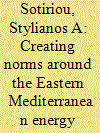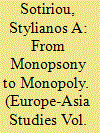|
|
|
Sort Order |
|
|
|
Items / Page
|
|
|
|
|
|
|
| Srl | Item |
| 1 |
ID:
171719


|
|
|
|
|
| Summary/Abstract |
The energy discoveries in the Eastern Mediterranean since the 2000s have placed the long-standing rivalry between Turkey and Cyprus (and by extension Greece) in a new context, bringing also Egypt and Israel into the geopolitical equation. Turkey, on the one hand, has adopted an assertive profile, whereas, on the other hand, two axes of cooperation have been formed, Greece-Cyprus-Egypt and Greece-Cyprus-Israel, convening trilateral summits and signing agreements. In view of that, it is currently upheld that the confluence of energy interests among the actors of the trilateral summits has facilitated a legalisation throughout the Eastern Mediterranean, propelling states towards the development of the energy resources according to the UNCLOS, and the implementation of the international law in the Cyprus problem, as a necessary means of guaranteeing the actors’ sovereignty, creating norms, and enhancing security, without targeting any third country. The argument shows how legalisation, as a special form of institutionalisation, and soft law, in particular, nurture regional cooperation and place it under the “protective wings” of international institutions.
|
|
|
|
|
|
|
|
|
|
|
|
|
|
|
|
| 2 |
ID:
190093


|
|
|
|
|
| Summary/Abstract |
The completion of the natural gas pipeline ‘Power of Siberia’ in 2019 creates new dynamics in Eurasian trade. Russia’s deepening ties with China present it with the opportunity to change its relationship with the European Union from monopsony to monopoly, thus gaining bargaining leverage. However, this argument goes both ways, being also applicable to Russo–Chinese affairs, with the European Union as the alternative option. The article concludes that Russia, while seriously strengthened by its developing energy relationship with China, will not endanger its status as a reliable supplier across Eurasia, since its nascent monopoly position depends on the existence of an alternative option.
|
|
|
|
|
|
|
|
|
|
|
|
|
|
|
|
|
|
|
|
|